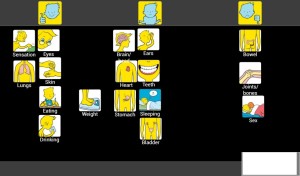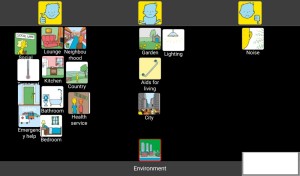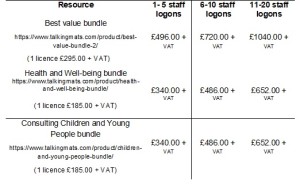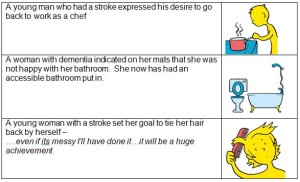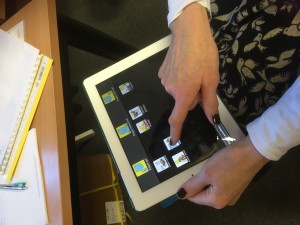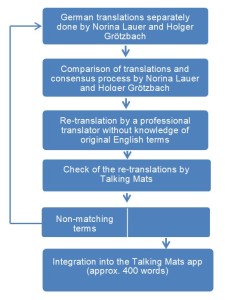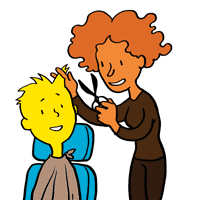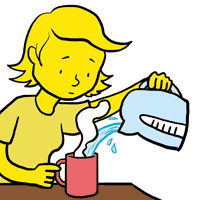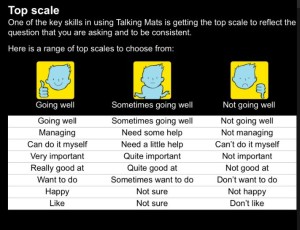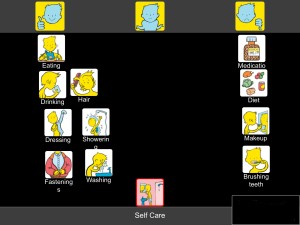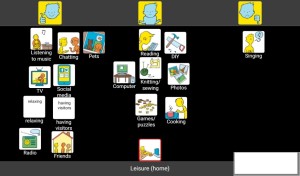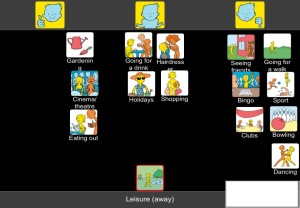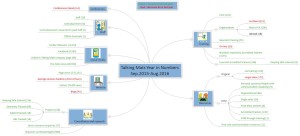Rachel Woolcomb, our Talking Mats OT Associate, tells us about the recent Royal College of Occupational Therapists’ Report and considers the ways Talking Mats can support:
The Royal College of Occupational Therapists have recently published a new report. “Making personalised care a reality: The role of occupational therapy.”
As the OT Associate for Talking Mats, I took the opportunity to review the document and consider how Talking Mats can help OT’s in fulfilling the recommendations made.
The report recognises that people living with long-term conditions bring different and equally important, knowledge and expertise to the decision –making process.
It challenges OT’s to ensure that they really listen to, and hear the views of the people they work with.
A Talking Mat can help facilitate this. It helps people to understand what is being discussed, to reflect and organise their thoughts, to say what matters most to them and record their views. It helps OT’s to really listen, to learn new information, to involve the person in their own planning and support decision making.
Read more about how Talking Mats can help OT’s to make personalised care a reality in the TMOT Resource 1: TM Personalised Care – Copy.
The RCOT report is available here: https://www.rcot.co.uk/news/delivering-personalised-care-frontline
Rachel would love to hear from you if you have any examples of how Talking Mats have helped you to provide personalised care, or if you want to know more about OT and Talking Mats. Her email is: Rachel@talkingmats.com.
If you are feeling inspired and would like to find out about accessing Talking Mats Foundation Training, take a look at our upcoming courses across the UK, as well as online and organisational training options: https://www.talkingmats.com/training/
Grateful thanks to Prof. Dr. Norina Lauer, OTH Regensburg – University of Applied Sciences, Germany for this blog.
At the conference of the German Society for Aphasia Research and Treatment (GAB) from the 1st to the 3rd of November Franziska Rau presented a poster – Let pictures talk – about her bachelor thesis on Talking Mats.
Speech and language therapists from German-speaking countries meet at this conference to present their latest research findings. This year’s theme was ” Aphasia Therapy Digital”.
The presented bachelor thesis about Talking Mats was performed at the HAN University of Applied Sciences, Netherlands, and was written by Franziska Rau together with Karoline Bitter and Lara Stobrawe. The students asked 29 people with aphasia and 63 people without aphasia for how representative they rated the images and terms used in the Communication section of the Digital Talking Mats Health & Well-being resource. While the healthy persons judged many items as not clear enough, the people with aphasia estimated significantly more pictures and names as appropriate. For this purpose, various reasons have been discussed, such as the possibility that the persons with aphasia directly perceived the pictures and terms as aids, while healthy persons judged more critically on the basis of the task. But also problems of concentration or comprehension in people with aphasia would be causally conceivable. This should be examined in further studies.
The poster was presented as part of a poster session and was well received by the audience. Thanks to Franziska, Karoline and Lara for their great study and to Holger Grötzbach, Janine Coopmans and Xaver Koch who supported the students.
We are always happy to receive projects and posters from anyone studying how Talking Mats can be used
We are very grateful to Elena Maxheimer, a Speech and Language Therapy student from Germany, for sending us this blog of a summary of her thesis which examined the use of the German Digital Talking Mats with people with aphasia.
In May 2018 I did my bachelor thesis on the German version of the Talking Mats app. Under the consultation of Prof. Dr. Norina Lauer, I delivered two workshops for eight people with aphasia. In these workshops the participants practiced doing Talking Mats and afterwards they evaluated the app by filling out a short questionnaire and taking part in a focus group in which they discussed the app’s content and practical use.
The participants generally rated the app as useful for people with aphasia and in particular, the topics, pictures and terms were rated as suitable for people with aphasia. The two most chosen topics were Health and Communication. Some aspects were difficult for people with aphasia. Some of the group had problems in choosing a suitable scale, writing on an empty card or writing down comments.
Suggestions for modification were
– Showing two sessions of Talking Mats parallel to have a better comparison
– Using the app on the smartphone – however the screen on a smartphone is too small to be manageable
– Saving the login data, so you don’t have to login every time you use the app
– One older participant suggested additional topics about specific diseases such as diabetes
– Another younger participant wanted more about sex, feelings, sympathy and love.
For other information about Talking Mats in Germany click here
Also Joan Murphy and Norina Lauer will be running a Talking Mats workshop in Cologne on May 5th and 6th 2019
Talking Mats received funding from The Health and Social Care Alliance Scotland to look at how using the Digital Talking Mats can help people with long term conditions, including dementia, to manage their health and well-being and to recognise their own strengths and abilities. We also hoped that participants would be able to have more control over their lives and have improved communication with families and professionals.
11 people living with dementia and their partners were involved in the project. Each participant had a tablet device and was given a personal digital Talking Mats licence which gave them access to 13 topics in the Talking Mats Health and Well-being resource. We visited each participant at home, taught them how to use it and asked them to complete at least 1 digital Talking Mat per week for 6 weeks on any topic they wished. The design of the digital Talking Mat allowed them to email their mats directly to us. We visited each participant a second time to discuss how easy it was to use the digital Talking Mats and their views on their completed mats. We asked those who wished to, to continue sending us completed mats beyond the initial 6 weeks and we visited them again in 6 months to discuss how they were managing.
In total we received 94 digital mats across all 13 topics from the participants living with dementia who reported that the use of the Digital Talking Mats during this project gave them a better understanding of their own individual health and social care needs.
A woman with dementia said ‘It (Health mat ) made me realise things are not so bad and made me think I will continue with my exercise classes, carry on walking, socialising and eating well’
As well as helping participants self-manage their lives, an unexpected outcome of this project was that many people found that using the Digital Talking Mats helped them see the positive things in their life and not just the negative. It also highlighted that despite having a deteriorating illness, things were not getting worse.
‘This mat (Environment) showed me how happy I am in my own home and my neighbourhood’
The following are some of the comments we received throughout the project.
• It helps me sort out my thoughts – very useful
• I get so much out of the process
• I come up with insights which might help me in the future
• I can now talk to (my wife) in a way I couldn’t before
• I’m more relaxed now
• I come up with niggly health things that my partner didn’t know
‘It made me realise things are not so bad’.
If you know of anyone living with dementia would like to obtain the Digital Talking Mats please fill in the attached Personal Digital Licence 161117 DTM personal licence form with explanation and send it to us at info@talkingmats.com
The Talking Mats digital app is available for organisations to purchase. This is an efficient way to support staff to evidence person centred planning.
The digital app typically operates via individual logons which means personal data is kept securely and it complies with data protection and client confidentiality. The individual with the logon can use their Digital Talking Mat with as many client/patients as they want.
We recognise that organisations may want to purchase several logons for staff to access digital Talking Mats and for that reason have created an Organisational Talking Mats digital licence. The savings are significant.
For application criteria please contact the Talking Mats office on 01786 479511
Self-management for people with long term conditions (LTC) is now a key government strategy to encourage people to take responsibility for their own health, behaviour and well-being. Talking Mats received funding from The Health and Social Care Alliance Scotland to look how using the Digital Talking Mats (DTM) can help people with LTCs to manage their health and well-being and to recognise their own strengths and abilities.
The overall aim of our project was to empower people with different long term conditions, to manage their own health and well-being. Through using Digital Talking Mats (DTM) we hoped that participants would be able to have more control over their lives and have improved communication with families and professionals.
There were a total of 28 participants in this project living with one of three different long term health conditions – stroke, dementia and learning disability. Each participant had access to a tablet device and was given a personal DTM licence which gave them access to 13 topics in the Talking Mats Health and Well-being resource. We visited each participant at home and taught them how to use it and asked them to complete and send us at least 1 digital mat per week for 6 weeks on any topic they wished. The design of the digital Talking Mat allowed them to email their mats directly to the researchers. We visited each participant a second time to discuss on how easy it was to use the digital Talking Mats and their views on their completed mats. We asked those who wished to, to continue sending us completed mats beyond the initial 6 weeks. We visited them again in 6 months to discuss how they were managing.
15 participants completed all 6 mats and 12 participants continued to complete mats over the length of the project. Participants completed 235 digital mats across all 13 topics
There were 3 particularly significant findings
1. At 18 months the participants living with dementia actually felt their well-being had improved, despite dementia being a progressive illness.
2. For the participants living with stroke the results were even more striking as 95% felt things were going well at the end of the project in comparison with 47% at the beginning.
3. At the end of the project the percentage of people with learning disability who felt things were not going well had reduced from 19% to 10%. Furthermore the percentage of people indicating that they were not sure about their views had increased from 27% to 42%. There can be a tendency for people with learning disability when using Talking Mats, to express their views at either end of the mat and to rarely use the mid- point. However being able to use the unsure mid- point is noteworthy as it indicates that the participants in the project realised that they could express their views not only as black or white but could indicate that they were unsure. This awareness opens up the potential for people to express views more thoughtfully with opportunities for further exploration.
Here are three examples of how using the DTM supported people to self-manage situations in their lives. Click on image to enlarge.
As well as helping participants self-manage their long term conditions, an unexpected outcome of this project is that many people found that using the DTM helped them see the positive things in their life and not just the negative. It also highlighted that despite having a long term condition and, for many also a deteriorating one, that things were not getting worse.
Click here for full report including 6,12 and 18 month reports to the funders 20180717 Alliance full report
Click here for the summary report 20180717 Alliance Final Short Report
Click here for a video link of 2 participants
We are delighted that ‘Talking Mats in German’ is now available in the Digital version and includes the latest technical and symbol upgrades. These upgrades are also now included in the English version.
Please click on this link to find out about all the upgrades.
We are very grateful to Prof Norina Lauer for sending us this blog which explains how ‘Talking Mats in German’ has been developed.
In 2016 Prof. Dr. Norina Lauer, a German professor for speech language therapy contacted Joan Murphy from Talking Mats because she was initially interested in the digital version for goal setting with people with aphasia. We found out that it would be interesting to have a German version of the app. So we started a project for translating Talking Mats into German. Prof. Dr. Norina Lauer managed the translation process. The project was financially supported by a German health insurance “BKK Dachverband” in cooperation with the German aphasia self-help organization “Bundesverband für die Rehabilitation der Aphasiker” (www.aphasiker.de). The translations were performed in a special scientific procedure to make sure that they match the English terms.
What did we do?
Norina Lauer and her colleague Holger Grötzbach independently translated the English terms into German. Subsequently these translations were compared and the differing terms were discussed until a consensus was reached. The agreed translations were given to a professional translator who only got the German words and the corresponding pictures. She re-translated the terms into English and these re-translations were checked by Talking Mats if they were in accordance with the original English terms. For those terms that did not match, the process started again until all terms matched the original English terms (figure 1 shows the translation process). This process was performed for all topics of the app. So we have the complete Talking Mats app in German now.
Figure 1
So what’s next?
Norina Lauer completed the foundation training and the accredited training in 2017. In October 2017 she performed her first foundation training for 6 of her SLT students. One of these students will do her bachelor thesis about the German app version in 2018. Under accompanying consultation of Norina Lauer the student will perform two workshops for people with aphasia. In these workshops they will practice doing Talking Mats and afterwards evaluate the app concerning its content and practical use. For the evaluation we are planning a short questionnaire and a focus group.
It has been a delight to work with Norina and we look forward to hearing the results of her student’s project.
If you already have the Digital Talking Mats make sure you upgrade to get all the new features. The German version with the upgraded is now available from the App store, Google Play (Free and Lite versions) or purchase the full version from our website .
We are always very grateful for comments and suggestions about our resources, so have been listening to our customers and working to upgrade the Talking Mats Health and Well-being resource and the 4 digital resources.
There are several additions which apply to both the original and the digital versions of Health and Well-being.
- Originally we had asked our artist not to put clothes on the characters to try to make them culturally neutral but following a number of comments – (in particular the bare hairdresser who caused much amusement!) – our artist has added clothes on those symbols where the character was obviously naked.
- Next we have included additional relevant symbols and altered others to make the resource more comprehensive.
Our App developer has also been working to incorporate all of the above features into the digital version. He has included a more comprehensive list of wording for the top scale. (Click on the image to enlarge)
He has also added a feature which lets you toggle the wording for the top scale on and off; he has sorted the split words under the symbols and he has improved how the final record of the Talking Mats is displayed in the email sent.
Finally we are delighted to announce that our 4 main Talking Mats resources have been developed in German for the Digital version in collaboration with Professor Norina Lauer at the University of Idstein. All 4 resources – Health and Well-being, Children and Young People, Eating and Drinking and Social Care will all be available on the App by clicking on the German flag in the opening page.
The German version is not available in the original hard copy but you can order the resources with no words to allow you to add your own.
The upgrades to the digital will happen automatically in the next few weeks at no extra cost and if you would like the hard copy sets to upgrade your original resources, you can order them from us at a reduced cost. 2017-18 Additional Symbols Post Training Order form
Thanks again for your feedback – keep the comments coming!
We are now half way through our project, funded by The Health and Social Care ALLIANCE Scotland, whose overall aim is to empower people with a range of long term conditions, with and without additional communication difficulties, to self-manage their own health and well-being by using Digital Talking Mats.
Participants
We have carried out all the initial visits and 16 follow-up visits and participants are sending in their completed mats, choosing whichever topics they want from the digital Health and Well-being resource. At the time of writing this blog we have received 137 completed mats.
We have received very positive feedback with many examples of how people are using the Digital Talking Mats to self-manage.
Here are 3 examples:
One participant with learning disability has diabetes. Through using the Digital Talking Mats she has stopped buying takeaways every night and is now buying M&S ‘Balanced for You’ meals. This is a huge step forward for her as she refused to discuss healthier eating before.
A man with early onset dementia has identified that he used to enjoy singing and has decided for the first time in his life to join a choir. This is not something that had come up in conversation before. Despite the diagnosis of dementia he has realised that he is still keen to try new things.
The wife of a man with severe aphasia said ‘This (Leisure away) has highlighted how few things he can do away from home. We discussed this but can’t see how we can change the situation.’ However at the second visit he used the same mat and indicated that he had been thinking about his mobility and was about to start swimming and a fitness class.
We already have an increased awareness of the meaning of self-management as we observe how participants are using the Digital Talking Mats to think about their situation, state their own views and share them with carers/support workers. We are also noticing that there is a shift in some relationships as the carers/support workers realise that the person with the long term conditions can make decisions and express their own views rather than having decisions made for them.
Talking Mat would like to wish you all a Happy Christmas
2106 has certainly been a busy year for us at Talking Mats. We have seen some staff changes saying goodbye to Jill hall and welcoming Morag Crawford. We were delighted when we brought Kirsty onto our staff . Kirsty originally volunteered with us as part of a school transition programme for people with autism. Laura Holmes joined us as a Talking Mats external associate for the North West of England.
If you are interested in what we do and want to see our activity in numbers then have a look at the Talking Mats Year in numbers . Click on image to see the enlarge !
At the moment we are busy preparing for 2017 and we are looking forward to
- The evaluation of our following projects in The New Year
- The National Involvement Network on our partnership with ARC Scotland
- Our programme of service wide training with Central London Community health
2 Continuing to work with
- Patient Opinion
- The Alliance Self-management digital project
- Colleagues in Germany
3 Launching more resources
- Keeping Safe- so far this resource has only been available to people working with people with learning disability in Scotland. We will be holding a specialist seminar about this resource in London on the 17th March so its use can extend south of the border .
- Launching our conversation sets: gardens, holidays, trips out, sports indoor, sports outdoor and football. These were developed as part of the family training for people with dementia but they have much wider use and will be available as additional Talking mats sets
Plus Talking Mat is planning to go to Australia in May!
Nicki and Lois have their flights booked. Agosci here we come ! Then we are over to New Zealand to run foundation training in Christchurch and Auckland before we head back to Melbourne to run the first ever accredited training course in Australia. We will also be running a specialist seminar on Keeping Safe in Melbourne. If you want any details about the trip please get in touch.
We really appreciate all the support we get from everyone involved in Talking Mats and wish you all a happy and peaceful festive season
 Online training login
Online training login 

